Here follows an elective report I wrote for Healthserve, a christian mission organisation which gave me a small scholarship towards my elective placement in South Africa. This was written over a year ago, so my outlook on certain things may have changed - but remains a good account of my time there.
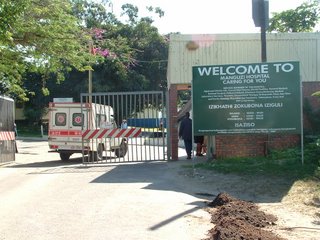
I was really inspired after attending a CMF electives day, to undertake an elective in a rural, third world area. South Africa was an obvious choice for me because I was born there and feel a certain connection to the country. It would have been easier, of course, to pick a big hospital in one of the cities to work at. I would have certainly seen a different side of South Africa if I had, one my relatives would have been more comfortable with. The area I was working in, at Manguzi Hospital, was comprised almost entirely of Zulus – an area largely forgotten about in the apartheid era. Consequently there was an abundance of poverty-related problems, and the area was largely rural and undeveloped. South Africa is a bipolar country, with opportunities and industry in developed areas; starvation and lack of education in other areas.
However, the Kosi Bay area near Manguzi was some of the most beautiful coastlines I could imagine, with lakes, dune forest, coastal grassland and raphia palms. I was glad to be taking my wife along with me; It was a shared experience and our strength in marriage enabled us to fulfill many of God’s challenges once there. I was certainly nervous on the way, it was the first time I had embarked on such an adventure.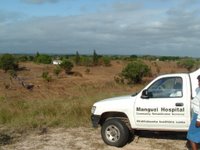 I felt like I’d put myself at God’s disposal, but was unsure what he really had planned for us. Was it going to be a life-changing experience? Was I going to make a difference to other people’s lives? Would I be able to hear God’s gentle voice leading me on the right path? It is difficult for me to answer these questions even now with 2 months hindsight. The experience has certainly opened my eyes to the richness of humanity, the value of forgiveness, and the difference God can make in the most remote circumstances. But I feel that it will take many more years of hindsight until I can look back at this elective and realise the influence it has had on me.
I felt like I’d put myself at God’s disposal, but was unsure what he really had planned for us. Was it going to be a life-changing experience? Was I going to make a difference to other people’s lives? Would I be able to hear God’s gentle voice leading me on the right path? It is difficult for me to answer these questions even now with 2 months hindsight. The experience has certainly opened my eyes to the richness of humanity, the value of forgiveness, and the difference God can make in the most remote circumstances. But I feel that it will take many more years of hindsight until I can look back at this elective and realise the influence it has had on me.
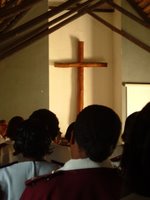 The spirituality underpinning Manguzi Hospital is clearly evident. It was originally a missionary hospital established by the Methodist Church in 1948. If it weren’t for them, the local inhabitants would never have been provided health care, certainly not by the state. Since the 1980s all these rural hospitals were taken over by the Department of Health, but many still retain their Christian ethos, as does Manguzi. This is mainly down to the staff, in particular the nurses. Once a week on a Friday morning, about 40 nurses will meet in the hospital chapel and share praise and bible study. The hospital chapel is a clear focal point of the hospital, its traditional thatched roof being the first thing to catch the eye once through the hospital gates.
The spirituality underpinning Manguzi Hospital is clearly evident. It was originally a missionary hospital established by the Methodist Church in 1948. If it weren’t for them, the local inhabitants would never have been provided health care, certainly not by the state. Since the 1980s all these rural hospitals were taken over by the Department of Health, but many still retain their Christian ethos, as does Manguzi. This is mainly down to the staff, in particular the nurses. Once a week on a Friday morning, about 40 nurses will meet in the hospital chapel and share praise and bible study. The hospital chapel is a clear focal point of the hospital, its traditional thatched roof being the first thing to catch the eye once through the hospital gates.
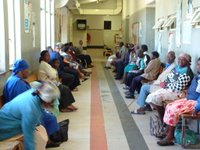 My experience of Manguzi spirituality centred around the medical staff though, none of whom were Zulu. I quickly realised that most of the staff were Christian, and was even able to attend a weekly bible-study at the medical manager’s house. Christianity clearly shapes hospital policy, as seen in their hospital mission statements – all beginning “Under God...” Furthermore, the now legal practice of abortion is still forbidden under hospital policy. Individual Christian doctors will not even refer a patient to a centre which does practice it, and patients persistently requesting abortion are often forced to queue and see another doctor in the hope that someone else will refer them! A source of conflict existed with a local GP, who performs medical abortions (antigestagen followed by prostaglandin PV). 5% of these routinely require surgical evacuation, which are referred to Manguzi to perform. Often the patients in question will withhold the true reason for their miscarriage, presenting as an emergency. It makes the general surgeon, who is like myself a Catholic, very uncomfortable indeed.
My experience of Manguzi spirituality centred around the medical staff though, none of whom were Zulu. I quickly realised that most of the staff were Christian, and was even able to attend a weekly bible-study at the medical manager’s house. Christianity clearly shapes hospital policy, as seen in their hospital mission statements – all beginning “Under God...” Furthermore, the now legal practice of abortion is still forbidden under hospital policy. Individual Christian doctors will not even refer a patient to a centre which does practice it, and patients persistently requesting abortion are often forced to queue and see another doctor in the hope that someone else will refer them! A source of conflict existed with a local GP, who performs medical abortions (antigestagen followed by prostaglandin PV). 5% of these routinely require surgical evacuation, which are referred to Manguzi to perform. Often the patients in question will withhold the true reason for their miscarriage, presenting as an emergency. It makes the general surgeon, who is like myself a Catholic, very uncomfortable indeed.
 For my time, medically, I often felt like I was only observing and doing little to help. I may have learnt lots, but was I making the idealistic difference I had always imagined when the word ‘mission’ was mentioned? The truth is, God’s plan for me as a witnessing Christian went far beyond my own human effort. God merely wanted me to be in the right place, at the right time, being myself – He did the rest. A group of South African students assured us that my wife and I were ‘glorifying God’ just by wearing our wedding rings around the town, and talking about our marriage when asked. That seems incredible, but that comment made perfect sense to me having learned something about the cultural climate in tribal South Africa. It is easy to criticise promiscuity and the spread of sexually transmitted infections in such a culture, but the morals go far deeper than lack of self-control. Clearly the problem of infidelity is present in many social situations all around the world, with many reasons behind them. But a factor which seemed to crop up again and again in Manguzi was the financial barrier to marriage: Lobola. This is an old tribal tradition whereby the bridegroom’s people are obliged to hand over a present of goods or cattle (but invariably a sum of money) to the father of the bride, in order to supplement a prospective marriage and ensure the right of the bridegroom to the marriage. In other words, it costs a young man a lot to commit.
For my time, medically, I often felt like I was only observing and doing little to help. I may have learnt lots, but was I making the idealistic difference I had always imagined when the word ‘mission’ was mentioned? The truth is, God’s plan for me as a witnessing Christian went far beyond my own human effort. God merely wanted me to be in the right place, at the right time, being myself – He did the rest. A group of South African students assured us that my wife and I were ‘glorifying God’ just by wearing our wedding rings around the town, and talking about our marriage when asked. That seems incredible, but that comment made perfect sense to me having learned something about the cultural climate in tribal South Africa. It is easy to criticise promiscuity and the spread of sexually transmitted infections in such a culture, but the morals go far deeper than lack of self-control. Clearly the problem of infidelity is present in many social situations all around the world, with many reasons behind them. But a factor which seemed to crop up again and again in Manguzi was the financial barrier to marriage: Lobola. This is an old tribal tradition whereby the bridegroom’s people are obliged to hand over a present of goods or cattle (but invariably a sum of money) to the father of the bride, in order to supplement a prospective marriage and ensure the right of the bridegroom to the marriage. In other words, it costs a young man a lot to commit.
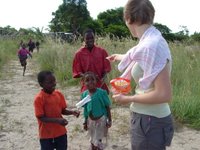 With poverty as rife as it is, and with selfishness often making the lobola an extortionately high price, men simply can’t afford to commit. The culture of fidelity is simply not there, especially in young people. Of course, making matters worse, HIV is extremely prevalent – with as many as 40% of women in antenatal clinics at Manguzi having the disease. It is not just a moral problem, but a matter of life and death. People are adamant to use condoms, which in any case wouldn’t change promiscuity. Female patients are more inclined to have tubal ligations, after having 8 children, as a method of contraception. One man, a member of staff, confided in me about a medical symptom of a sensitive nature, which sounded very much like an STI. When asked if he used condoms, he exclaimed “Of course I do, but not with my girlfriend”. What he meant by this is he uses protection when being unfaithful to his partner. I spoke to the same man about my experience of marriage and chastity, but he found this a hard example to follow both with the financial implications of Lobola, and with the long distance nature of his relationship (a problem faced by generations of migrant workers forced to leave their villages to find work). It is a huge challenge for Christian missionaries to preach the theology of the body when the society is not conducive to these aims.
With poverty as rife as it is, and with selfishness often making the lobola an extortionately high price, men simply can’t afford to commit. The culture of fidelity is simply not there, especially in young people. Of course, making matters worse, HIV is extremely prevalent – with as many as 40% of women in antenatal clinics at Manguzi having the disease. It is not just a moral problem, but a matter of life and death. People are adamant to use condoms, which in any case wouldn’t change promiscuity. Female patients are more inclined to have tubal ligations, after having 8 children, as a method of contraception. One man, a member of staff, confided in me about a medical symptom of a sensitive nature, which sounded very much like an STI. When asked if he used condoms, he exclaimed “Of course I do, but not with my girlfriend”. What he meant by this is he uses protection when being unfaithful to his partner. I spoke to the same man about my experience of marriage and chastity, but he found this a hard example to follow both with the financial implications of Lobola, and with the long distance nature of his relationship (a problem faced by generations of migrant workers forced to leave their villages to find work). It is a huge challenge for Christian missionaries to preach the theology of the body when the society is not conducive to these aims.  The Zulus are proud of their culture and roots, and it would be out of the question to abolish Lobola, despite many foreign Christians thinking this to be the way forward. Any mission work must tread the fine line between preaching the Truth of the Gospel, and becoming overtly confrontational. How receptive are the Zulus to foreigners challenging their way of life? Only empathy can tell us the answer to this question. The humility of the Christian must shine through, acknowledging that it is the Holy Spirit’s job to change hearts and minds.
The Zulus are proud of their culture and roots, and it would be out of the question to abolish Lobola, despite many foreign Christians thinking this to be the way forward. Any mission work must tread the fine line between preaching the Truth of the Gospel, and becoming overtly confrontational. How receptive are the Zulus to foreigners challenging their way of life? Only empathy can tell us the answer to this question. The humility of the Christian must shine through, acknowledging that it is the Holy Spirit’s job to change hearts and minds.
However, the Kosi Bay area near Manguzi was some of the most beautiful coastlines I could imagine, with lakes, dune forest, coastal grassland and raphia palms. I was glad to be taking my wife along with me; It was a shared experience and our strength in marriage enabled us to fulfill many of God’s challenges once there. I was certainly nervous on the way, it was the first time I had embarked on such an adventure.
 I felt like I’d put myself at God’s disposal, but was unsure what he really had planned for us. Was it going to be a life-changing experience? Was I going to make a difference to other people’s lives? Would I be able to hear God’s gentle voice leading me on the right path? It is difficult for me to answer these questions even now with 2 months hindsight. The experience has certainly opened my eyes to the richness of humanity, the value of forgiveness, and the difference God can make in the most remote circumstances. But I feel that it will take many more years of hindsight until I can look back at this elective and realise the influence it has had on me.
I felt like I’d put myself at God’s disposal, but was unsure what he really had planned for us. Was it going to be a life-changing experience? Was I going to make a difference to other people’s lives? Would I be able to hear God’s gentle voice leading me on the right path? It is difficult for me to answer these questions even now with 2 months hindsight. The experience has certainly opened my eyes to the richness of humanity, the value of forgiveness, and the difference God can make in the most remote circumstances. But I feel that it will take many more years of hindsight until I can look back at this elective and realise the influence it has had on me. The spirituality underpinning Manguzi Hospital is clearly evident. It was originally a missionary hospital established by the Methodist Church in 1948. If it weren’t for them, the local inhabitants would never have been provided health care, certainly not by the state. Since the 1980s all these rural hospitals were taken over by the Department of Health, but many still retain their Christian ethos, as does Manguzi. This is mainly down to the staff, in particular the nurses. Once a week on a Friday morning, about 40 nurses will meet in the hospital chapel and share praise and bible study. The hospital chapel is a clear focal point of the hospital, its traditional thatched roof being the first thing to catch the eye once through the hospital gates.
The spirituality underpinning Manguzi Hospital is clearly evident. It was originally a missionary hospital established by the Methodist Church in 1948. If it weren’t for them, the local inhabitants would never have been provided health care, certainly not by the state. Since the 1980s all these rural hospitals were taken over by the Department of Health, but many still retain their Christian ethos, as does Manguzi. This is mainly down to the staff, in particular the nurses. Once a week on a Friday morning, about 40 nurses will meet in the hospital chapel and share praise and bible study. The hospital chapel is a clear focal point of the hospital, its traditional thatched roof being the first thing to catch the eye once through the hospital gates. My experience of Manguzi spirituality centred around the medical staff though, none of whom were Zulu. I quickly realised that most of the staff were Christian, and was even able to attend a weekly bible-study at the medical manager’s house. Christianity clearly shapes hospital policy, as seen in their hospital mission statements – all beginning “Under God...” Furthermore, the now legal practice of abortion is still forbidden under hospital policy. Individual Christian doctors will not even refer a patient to a centre which does practice it, and patients persistently requesting abortion are often forced to queue and see another doctor in the hope that someone else will refer them! A source of conflict existed with a local GP, who performs medical abortions (antigestagen followed by prostaglandin PV). 5% of these routinely require surgical evacuation, which are referred to Manguzi to perform. Often the patients in question will withhold the true reason for their miscarriage, presenting as an emergency. It makes the general surgeon, who is like myself a Catholic, very uncomfortable indeed.
My experience of Manguzi spirituality centred around the medical staff though, none of whom were Zulu. I quickly realised that most of the staff were Christian, and was even able to attend a weekly bible-study at the medical manager’s house. Christianity clearly shapes hospital policy, as seen in their hospital mission statements – all beginning “Under God...” Furthermore, the now legal practice of abortion is still forbidden under hospital policy. Individual Christian doctors will not even refer a patient to a centre which does practice it, and patients persistently requesting abortion are often forced to queue and see another doctor in the hope that someone else will refer them! A source of conflict existed with a local GP, who performs medical abortions (antigestagen followed by prostaglandin PV). 5% of these routinely require surgical evacuation, which are referred to Manguzi to perform. Often the patients in question will withhold the true reason for their miscarriage, presenting as an emergency. It makes the general surgeon, who is like myself a Catholic, very uncomfortable indeed. For my time, medically, I often felt like I was only observing and doing little to help. I may have learnt lots, but was I making the idealistic difference I had always imagined when the word ‘mission’ was mentioned? The truth is, God’s plan for me as a witnessing Christian went far beyond my own human effort. God merely wanted me to be in the right place, at the right time, being myself – He did the rest. A group of South African students assured us that my wife and I were ‘glorifying God’ just by wearing our wedding rings around the town, and talking about our marriage when asked. That seems incredible, but that comment made perfect sense to me having learned something about the cultural climate in tribal South Africa. It is easy to criticise promiscuity and the spread of sexually transmitted infections in such a culture, but the morals go far deeper than lack of self-control. Clearly the problem of infidelity is present in many social situations all around the world, with many reasons behind them. But a factor which seemed to crop up again and again in Manguzi was the financial barrier to marriage: Lobola. This is an old tribal tradition whereby the bridegroom’s people are obliged to hand over a present of goods or cattle (but invariably a sum of money) to the father of the bride, in order to supplement a prospective marriage and ensure the right of the bridegroom to the marriage. In other words, it costs a young man a lot to commit.
For my time, medically, I often felt like I was only observing and doing little to help. I may have learnt lots, but was I making the idealistic difference I had always imagined when the word ‘mission’ was mentioned? The truth is, God’s plan for me as a witnessing Christian went far beyond my own human effort. God merely wanted me to be in the right place, at the right time, being myself – He did the rest. A group of South African students assured us that my wife and I were ‘glorifying God’ just by wearing our wedding rings around the town, and talking about our marriage when asked. That seems incredible, but that comment made perfect sense to me having learned something about the cultural climate in tribal South Africa. It is easy to criticise promiscuity and the spread of sexually transmitted infections in such a culture, but the morals go far deeper than lack of self-control. Clearly the problem of infidelity is present in many social situations all around the world, with many reasons behind them. But a factor which seemed to crop up again and again in Manguzi was the financial barrier to marriage: Lobola. This is an old tribal tradition whereby the bridegroom’s people are obliged to hand over a present of goods or cattle (but invariably a sum of money) to the father of the bride, in order to supplement a prospective marriage and ensure the right of the bridegroom to the marriage. In other words, it costs a young man a lot to commit. With poverty as rife as it is, and with selfishness often making the lobola an extortionately high price, men simply can’t afford to commit. The culture of fidelity is simply not there, especially in young people. Of course, making matters worse, HIV is extremely prevalent – with as many as 40% of women in antenatal clinics at Manguzi having the disease. It is not just a moral problem, but a matter of life and death. People are adamant to use condoms, which in any case wouldn’t change promiscuity. Female patients are more inclined to have tubal ligations, after having 8 children, as a method of contraception. One man, a member of staff, confided in me about a medical symptom of a sensitive nature, which sounded very much like an STI. When asked if he used condoms, he exclaimed “Of course I do, but not with my girlfriend”. What he meant by this is he uses protection when being unfaithful to his partner. I spoke to the same man about my experience of marriage and chastity, but he found this a hard example to follow both with the financial implications of Lobola, and with the long distance nature of his relationship (a problem faced by generations of migrant workers forced to leave their villages to find work). It is a huge challenge for Christian missionaries to preach the theology of the body when the society is not conducive to these aims.
With poverty as rife as it is, and with selfishness often making the lobola an extortionately high price, men simply can’t afford to commit. The culture of fidelity is simply not there, especially in young people. Of course, making matters worse, HIV is extremely prevalent – with as many as 40% of women in antenatal clinics at Manguzi having the disease. It is not just a moral problem, but a matter of life and death. People are adamant to use condoms, which in any case wouldn’t change promiscuity. Female patients are more inclined to have tubal ligations, after having 8 children, as a method of contraception. One man, a member of staff, confided in me about a medical symptom of a sensitive nature, which sounded very much like an STI. When asked if he used condoms, he exclaimed “Of course I do, but not with my girlfriend”. What he meant by this is he uses protection when being unfaithful to his partner. I spoke to the same man about my experience of marriage and chastity, but he found this a hard example to follow both with the financial implications of Lobola, and with the long distance nature of his relationship (a problem faced by generations of migrant workers forced to leave their villages to find work). It is a huge challenge for Christian missionaries to preach the theology of the body when the society is not conducive to these aims.  The Zulus are proud of their culture and roots, and it would be out of the question to abolish Lobola, despite many foreign Christians thinking this to be the way forward. Any mission work must tread the fine line between preaching the Truth of the Gospel, and becoming overtly confrontational. How receptive are the Zulus to foreigners challenging their way of life? Only empathy can tell us the answer to this question. The humility of the Christian must shine through, acknowledging that it is the Holy Spirit’s job to change hearts and minds.
The Zulus are proud of their culture and roots, and it would be out of the question to abolish Lobola, despite many foreign Christians thinking this to be the way forward. Any mission work must tread the fine line between preaching the Truth of the Gospel, and becoming overtly confrontational. How receptive are the Zulus to foreigners challenging their way of life? Only empathy can tell us the answer to this question. The humility of the Christian must shine through, acknowledging that it is the Holy Spirit’s job to change hearts and minds.If you are interested in gaining experience in rural South Africa, get in touch with Africa Health Placements, who will be able to provide you with specialist advice.



















Great hearing the perspectives of an outsider about South Africa.
ReplyDeleteHi Matthew,
ReplyDeleteGood to read about your experience in Manguzi. I am booked for a seven-week elective there in June and July of this year. I was wondering if you would be prepared to get in touch with any advice you might have, organisational, or on how to get the most out of my time there.
Thanks,
Andrew
Thanks Andrew. Please email me (look at my profile) to get in touch, and I can give you some pointers. You'll have a great time. God bless, and look forward to hearing from you.
ReplyDeleteOur son Dennis did his elective at Manguzi! He is now working in Ireland as he could not get a job in England.
ReplyDelete